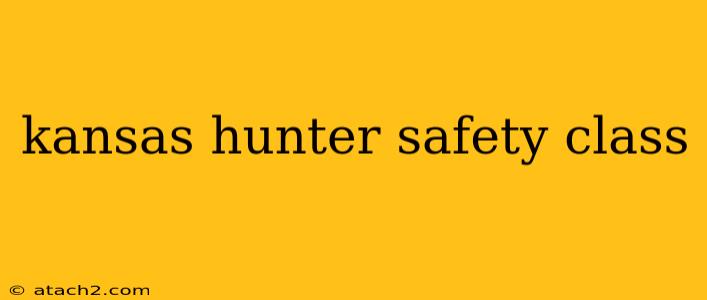Becoming a responsible hunter in Kansas requires completing a hunter education course. This comprehensive guide will walk you through everything you need to know about the Kansas Hunter Safety Class, ensuring you're fully prepared for your first hunting trip, or to simply brush up on your knowledge.
Understanding the Kansas Hunter Education Requirement
Kansas law mandates that all hunters born after January 1, 1958, must successfully complete a hunter education course before purchasing a hunting license. This isn't just a formality; it's a crucial step in promoting safe and ethical hunting practices, protecting both hunters and wildlife. The course covers vital aspects of hunting, including firearm safety, wildlife identification, survival skills, and ethical hunting considerations.
Finding a Kansas Hunter Safety Course Near You
Several options are available for completing your hunter education in Kansas:
1. In-Person Classes:
Many in-person classes are offered throughout the state by various organizations, including the Kansas Department of Wildlife and Parks (KDWP). These classes provide a hands-on learning experience with instructors who can answer your questions directly. Check the KDWP website for a schedule of upcoming classes in your area. These often fill up quickly, so early registration is advised.
2. Online Courses:
For those who prefer a more flexible learning environment, several online hunter education courses are available. These courses typically involve self-paced modules, online tests, and sometimes a final in-person field day to cover practical skills. While convenient, ensure the course you choose is approved by the KDWP. Look for the KDWP's official seal of approval on the website before enrolling.
3. Youth Hunter Education Programs:
Many organizations offer specialized hunter education programs for youth, often incorporating age-appropriate activities and instruction. These programs are an excellent way to introduce young people to hunting in a safe and responsible manner. Contact your local conservation clubs or KDWP for details on youth programs in your area.
What to Expect in a Kansas Hunter Safety Class
Regardless of the format you choose, a typical Kansas Hunter Safety Class will cover the following key topics:
Core Curriculum:
- Firearm Safety: This is the most critical aspect, covering safe handling, storage, and transportation of firearms. You'll learn about the four primary rules of firearm safety and how to apply them in various hunting situations.
- Hunter Ethics and Responsibilities: Understanding fair chase, respecting private property, and adhering to hunting regulations are vital elements of ethical hunting.
- Wildlife Identification: Correctly identifying game animals and understanding their habitats is crucial for safe and legal hunting.
- Hunting Techniques and Strategies: You'll learn about different hunting methods, including archery, muzzleloader, and firearm hunting, along with the appropriate techniques for each.
- First Aid and Emergency Procedures: Knowing how to handle common hunting-related injuries and emergencies is paramount.
- Conservation and Wildlife Management: Understanding the importance of conservation and sustainable hunting practices is key to preserving wildlife populations for future generations.
Practical Skills (Often Included in In-Person Classes):
- Safe Gun Handling Demonstrations: You'll have the opportunity to practice safe gun handling techniques under the supervision of experienced instructors.
- Field Exercises: These activities often include scenarios designed to reinforce the concepts learned in the classroom.
Completing the Course and Obtaining Your Certification
Upon successful completion of the course, whether online or in-person, you'll receive a certificate of completion. This certificate is proof that you've met the Kansas hunter education requirement. Remember to keep this certificate safe; you'll likely need to present it when purchasing hunting licenses.
Beyond the Classroom: Continuing Your Education
The hunter safety course is just the beginning. Continuous learning is essential for responsible hunting. Stay updated on hunting regulations, improve your shooting skills, and continue to educate yourself on wildlife conservation. The KDWP website and other resources offer ongoing educational opportunities.
This comprehensive guide helps you navigate the process of taking your Kansas Hunter Safety Class. Remember to choose a course that suits your learning style and always prioritize safety. Happy hunting!

